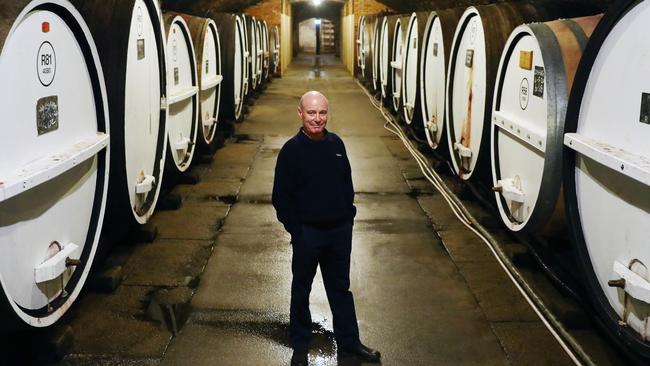Beijing threat to dump on Aussie wine traders
The Morrison government has criticised China’s anti-dumping probe into the $1.1bn wine export market.

China has launched an anti-dumping investigation into Australia’s $1.1bn wine export market, deepening bilateral tensions and threatening one of the major successes of the five-year-old free trade agreement.
The Morrison government criticised the move as “disappointing” amid growing concerns it was part of a strategic bid by Beijing to drive a wedge between business leaders and the government.
The action by China’s Ministry of Commerce on Tuesday to launch the anti-dumping investigation follows Beijing’s imposition of tariffs on Australian barley and the suspension of four meat exporters.
In April, China’s ambassador to Australia, Cheng Jingye, warned the Morrison government that its pursuit of an independent COVID-19 inquiry could trigger a Chinese consumer boycott of Australian exports including wine.
The Australian understands China’s targeting of discretionary exports, and not key commodities such as iron ore and coal, is expected to continue with concerns that milk powder products could be next.
Trade Minister Simon Birmingham described Beijing’s actions as “disappointing” and “perplexing” and said the government would work with the wine industry to “prevent the application of tariffs”.
The Australian understands Chinese authorities alerted Canberra about the anti-dumping investigation before its announcement and there will be no immediate impacts on Australian wine being exported to China. The Morrison government was also warned that China was preparing a probe into whether Australian wine exports had received or benefited from government subsidies.
“Australian wine is by no means subsidised; it is by no means sold at or below anything other than market rates in the world market,” Senator Birmingham said. “Australian wine during the first half of this year proved itself to be the second-highest priced wine sold in the Chinese market.”
The Australian wine industry emerged as one of the biggest beneficiaries under the China-Australia free trade agreement, which came into effect in 2015. Last year, Australia overtook France as the largest importer of wine into the lucrative Chinese market. Wine exports to China were $420m in 2015-16 but have more than doubled to about $1.1bn during the life of the FTA.
In the Nagambie Lakes region of central Victoria, fourth-generation winemaker and family patriarch Alister Purbrick is a regular traveller to China and exports a large proportion of his celebrated Tahbilk wines to the region.
Mr Purbrick, who is part of a collective of family owned wineries such as Henschke, d’Arenberg, Yalumba and Tyrrell’s, said the nation’s $6bn wine industry had been fearful for some time that political tensions between China and Australia could break out into a punitive action against Australian wine. The Chinese action adds to a string of crises that have hit the sector, from drought to COVID-19.
“We do not believe that the Australian Grape and Wine Industry has an anti-dumping case to answer and that any investigation will demonstrate this,” Mr Purbrick said.
“China is an important market for Australian wine and I look forward to the successful completion of the investigation and the opportunity to continue to build our relationship with our valued Chinese associates.”
Australian Grape and Wine chief executive Tony Battaglene conceded that the industry was concerned by Beijing’s decision and said it made no sense to accuse Australia of dumping wine selling at higher price points such as Penfolds in China.
“To suggest that we are dumping makes no sense,” Mr Battaglene said. “China is our highest price point market. Our highest value wine goes to China.”
Mr Battaglene said the wine industry, which had been hit hard by the bushfires and COVID-19, suspected it was being targeted because of a potential slowdown in China’s domestic wine market.
China’s anti-dumping investigation is expected to be completed by August 18 next year but could be extended until February, 2022. Speaking in Beijing on Tuesday, Foreign Ministry spokesman Zhao Lijian played down the political significance of what he described as a “normal anti-dumping investigation case” into Australian wine. He said China’s domestic wine industry had made a submission to the Ministry of Commerce on July 6.
“This is a normal anti-dumping investigation; do not over interpret it,” Mr Zhao said.
He continued the more restrained rhetoric China’s government has used since Foreign Minister Marise Payne in July said in Washington that Australia had “no intention of injuring” its relationship with China.
Senator Birmingham said Australia would “engage fully with the Chinese processes to strongly argue the case that there are no grounds to uphold the claims being made”.
The Australian understands Beijing could target milk powder products later this year if exports exceed quotas under the free trade agreement. A Dairy Australia spokesman said exports to China were running at a little over half of the annual 20,000-tonne limit specified under CHAFTA before preferential tariffs would be removed. There was no expectation in the industry that they would reach the trigger point until very late in the year.
Scott Morrison this month warned Australia must expand trade relationships to reduce its reliance on China. The federal government directed investment and resources to diversify the country’s export market and accelerate free trade deals.
In 2019-20, wine exports to countries other than China, which makes up 37 per cent of Australia’s overseas wine sales, increased in emerging European and Asian markets. More than $850m of Australia’s $2.9bn wine export market went to the US and Britain in the last financial year.
Shao Yi, 31, an art agent in Beijing, said she was a fan of Australian red wine. “I like the wine with mixed flavours — flavour of cigar, coffee and the wood barrel,” she said as she sampled an Australian Shiraz at Cheers Wine in the city’s east.
Chen Lin, the owner of Cheers wine shop, said 2020 had been a really difficult year for everybody.
“I don’t understand what the trouble is, but I want people on both sides to smooth it,” Ms Chen said. “No more trouble, please.”
Additional Reporting: Glenda Korporaal, Will Glasgow, Patrick Commins







To join the conversation, please log in. Don't have an account? Register
Join the conversation, you are commenting as Logout